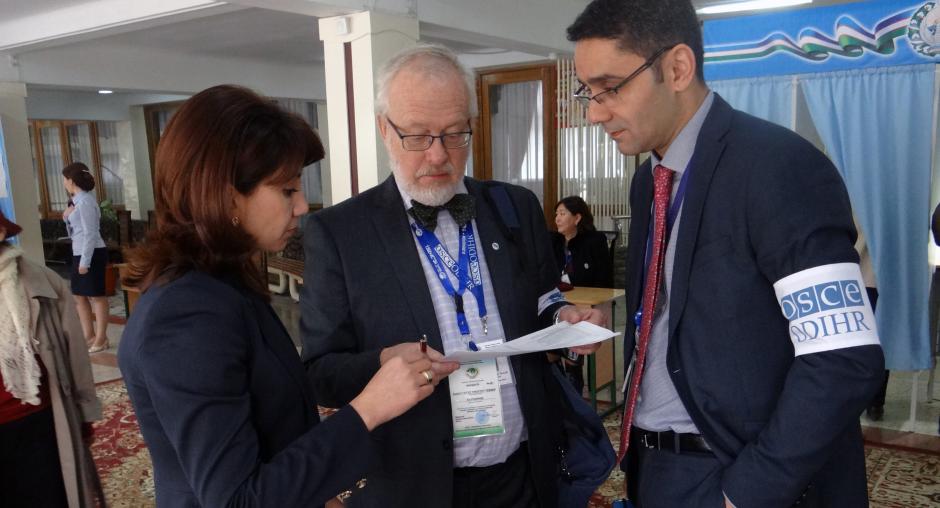How to join an ODIHR election mission

An ODIHR election observation mission (EOM) consists of a core team of experts, long-term observers (LTOs), and short-term observers (STOs). Candidates for all positions must be citizens of OSCE participating States, excluding the country where the election is taking place. Other ODIHR observation activities (limited observation missions, election assessment missions and election expert teams) comprise a smaller number of mission members.
ODIHR’s Election Observation Handbook: 6th Edition explains in greater detail the format and composition of ODIHR election-related activities and provides a complete overview of the ODIHR election observation methodology.
Individuals interested in joining ODIHR observation activities, including as core team experts and seconded and funded observers, are required to create a personal account in the new OSCE/ODIHR Election Expert Database.
Core Team
The core team is composed of 10 to 15 international experts, depending on the size of the mission and the specific needs of the OSCE participating State to which a mission is deployed, and includes both analysts and operations experts. Their assignments typically vary between 2 and 8 weeks.
Experts are selected through an open recruitment procedure, based on their qualifications and experience according to the responsibilities and requirements stipulated in the terms of reference for each position. To ensure balance and diversity, ODIHR considers nationality and gender in the team’s composition.
How to apply: Recruitment notices are posted on ODIHR’s Elections webpage, generally following the publication of a Needs Assessment Mission report. Candidates can apply for a maximum of two core team positions. In some cases ODIHR may recruit experts directly from the database; interested experts are therefore encouraged to regularly update their profiles. Read more
Long-term and Short-term Observers
Seconded observers
Depending on the format of the observation activity, OSCE participating States may be requested to second a certain number of LTOs and STOs. To promote geographic diversity among observers, each participating State may second up to a maximum of 15 per cent of the total number of requested LTOs or STOs. The seconding state is responsible to cover the costs of its observers.
How to apply: The OSCE/ODIHR does not directly manage the recruitment of seconded observers. Information on national procedures for recruiting observers can be requested from respective election observation focal points. In order for their candidacy to be considered, all potential observers are required to create a personal account on the Election Expert Database.
Read more
Funded observers
In addition to seconded observers, ODIHR may recruit a limited number of funded LTOs and STOs from eligible countries through its Diversification and Sustainability funds provided as voluntary extra-budgetary contributions by OSCE participating States. These funds are utilized based on need and available resources.
How to apply: Application and selection procedures differ for funded LTOs and STOs.
Funded LTOs are recruited directly by ODIHR. If a potential need of funded LTOs is anticipated, vacancies are published on the Election Expert Database alongside core team positions and are only visible for nationals of eligible countries. Interested candidates can apply through the database to express their availability. The posting of potential vacancies does not guarantee that a selection process will take place, as the final decision to utilize funded LTOs is taken based on need and available resources shortly before deployment. Read more
Funded STOs are selected by participating States, generally by the same focal point that manages the selection of seconded observers. Information on national procedures on funded STOs can be requested from respective focal points. Read more
Local Support Staff
A key component of every mission is its locally-recruited support staff. Local staff serve as interpreters, drivers, and as programmatic or administrative assistants to international personnel. In general, each member of the core team has one assistant. Some activities — especially media monitoring and logistical support — often require several assistants. Each LTO team and STO team is assisted by an interpreter and driver, recruited in the regions where observer teams are deployed.
How to apply: Recruitment notices are posted on the ODIHR Elections webpage. Candidates apply by sending their curriculum vitae to a dedicated e-mail address (Note - do not use the Election Expert Database).
Observer Training
ODIHR strongly encourages all interested observers to undertake its e-learning course for OSCE/ODIHR observers. The course is free and open to anyone interested in learning about ODIHR’s election observation methodology.
ODIHR also organizes in-person training courses for LTOs and STOs as part of its effort to diversify the geographical composition of its observation missions. Courses are financed by generous extra-budgetary contributions of the OSCE participating States and only nationals of countries eligible for Diversification Fund can be selected. Participants are pre-selected by participating States. Read more
In addition, ODIHR supports training efforts of OSCE participating States by sending qualified trainers to their courses.
Information on relevant national procedures to join ODIHR courses and on courses organised at the national level can be requested from respective focal points.
No application fees are required by the OSCE/ODIHR for its recruitment process at any stage. The OSCE is an equal opportunity organization and encourages applications from women candidates.
